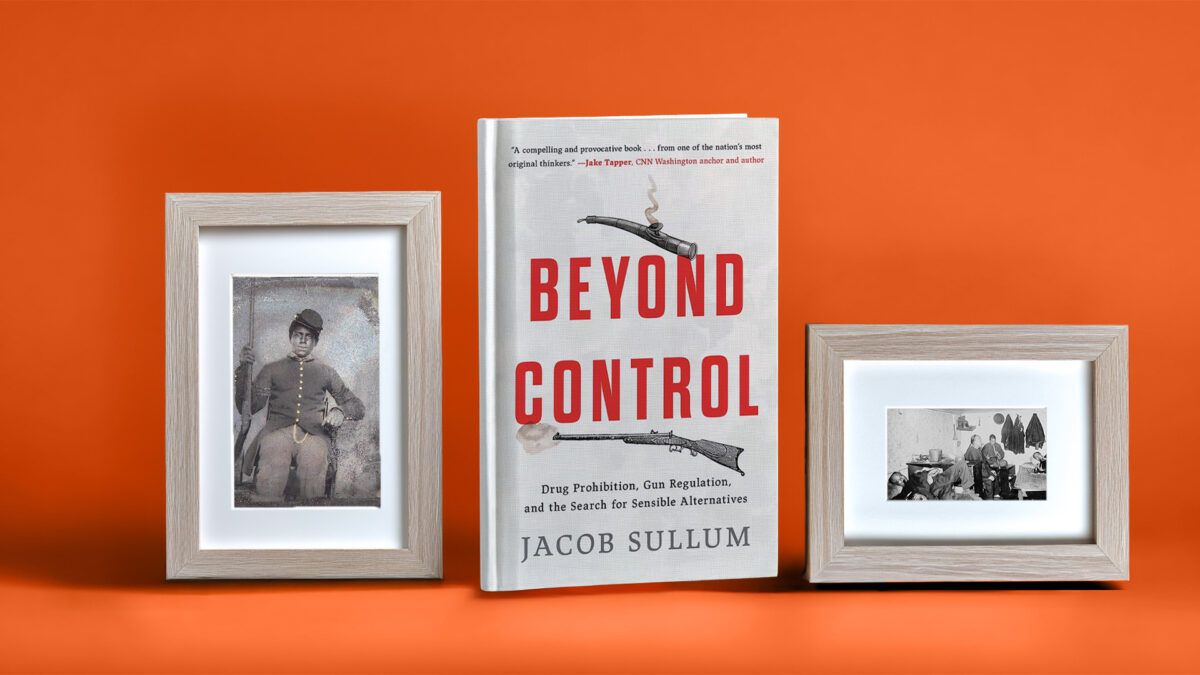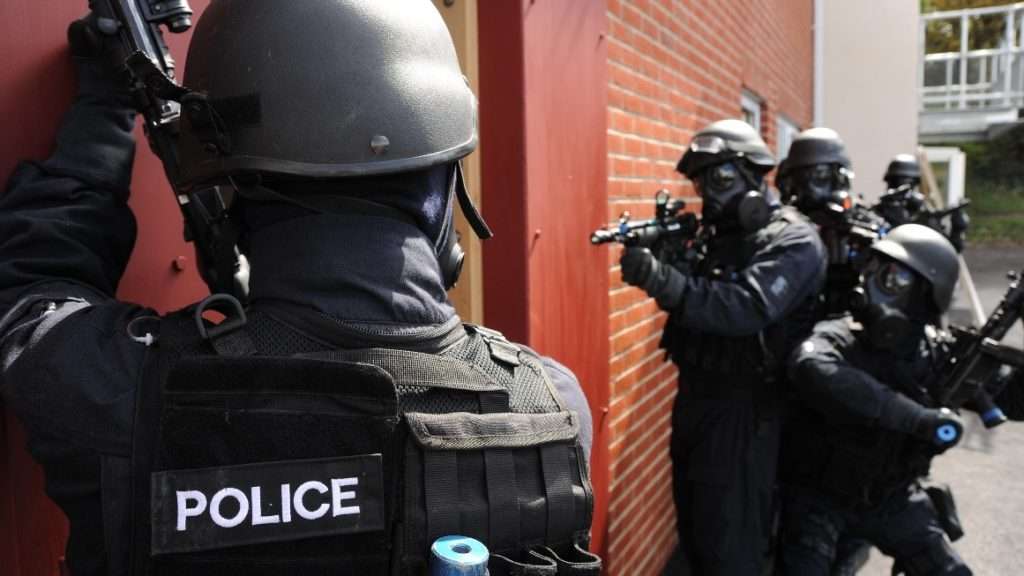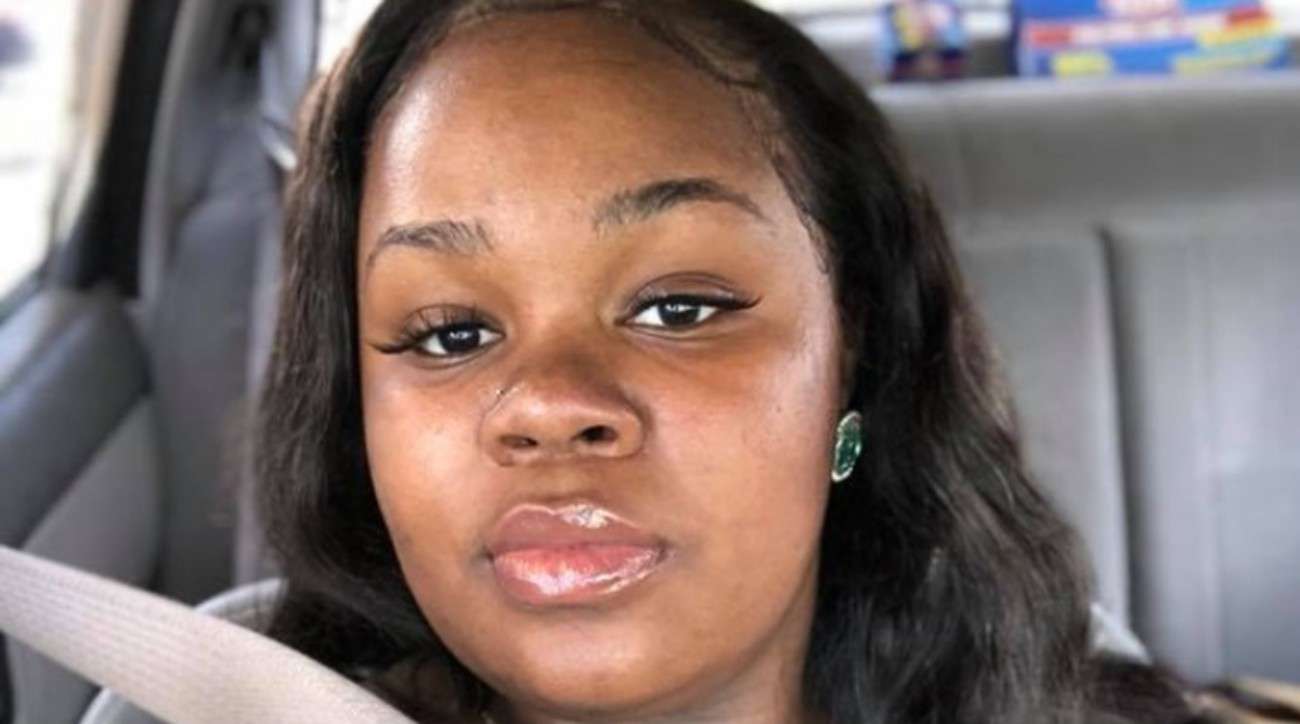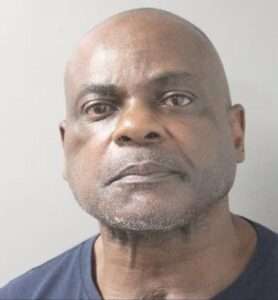'Botched' Drug Raids Show How Prohibition Invites Senseless Violence
The war on drugs authorizes police conduct that otherwise would be readily recognized as criminal.

When Alecia Phonesavanh heard her 19-month-old son, Bou Bou, screaming, she thought he was simply frightened by the armed men who had burst into the house in the middle of the night. Then she saw the charred remains of the portable playpen where the toddler had been sleeping, and she knew something horrible had happened.
Phonesavanh and her husband, Bounkham, had been staying with his sister, Amanda, in Cornelia, a small town in northeastern Georgia, for two months. It was a temporary arrangement after the couple's house in Wisconsin was destroyed by a fire. They and their four children, ranging in age from 1 to 7, occupied a garage that had been converted into a bedroom.
Around 2 a.m. on May 28, 2014, a SWAT team consisting of Habersham County sheriff's deputies and Cornelia police officers broke into that room without warning. One of the deputies, Charles Long, tossed a flash-bang grenade, a "distraction device" that is meant to discombobulate criminal suspects with a blinding flash and deafening noise, into the dark room. It landed in Bou Bou's playpen and exploded in his face, causing severe burns, disfiguring injuries, and a deep chest wound.
After the grenade exploded, the Phonesavanhs later reported, the officers forcibly prevented them from going to Bou Bou's aid and lied about the extent of his injuries, attributing the blood in the playpen to a lost tooth. The boy's parents did not realize how badly he had been hurt until they arrived at the hospital where the police took him. Bou Bou, who was initially placed in a medically induced coma, had to undergo a series of reparative surgeries that doctors said would continue into adulthood.
Habersham County Sheriff Joey Terrell said his men never would have used a flash-bang if they knew children were living in the home. They were looking for Wanis Thonetheva, Amanda's 30-year-old son, who allegedly had sold $50 worth of methamphetamine to a police informant a few hours earlier. But Thonetheva, who no longer lived in his mother's house, was not there. Nor did police find drugs, drug money, weapons, or any other evidence of criminal activity.
"The baby didn't deserve this," Terrell conceded. "The family didn't deserve this." Although "you try and do everything right," he said, "bad things can happen. That's just the world we live in. Bad things happen to good people." He blamed Thonetheva, who he said was "no better than a domestic terrorist."
As is often the case with drug raids, the initial, self-serving police account proved to be inaccurate in several crucial ways. Although Thonetheva supposedly was armed and dangerous, he proved to be neither: He was unarmed when he was arrested later that night at his girlfriend's apartment without incident (and without the deployment of a "distraction device"). Although Terrell claimed police had no reason to believe they were endangering children, even cursory surveillance could easily have discovered that fact: There were children's toys, including a plastic wading pool, in the yard, where Bounkham frequently played with his kids. In the driveway was a minivan containing four child seats that was decorated with decals depicting a mother, a father, three little girls, and a baby boy.
Four months after the raid, a local grand jury faulted the task force that executed it for a "hurried" and "sloppy" investigation that was "not in accordance with the best practices and procedures." Ten months after that, a federal grand jury charged Nikki Autry, the deputy who obtained the no-knock warrant for the raid, with lying in her affidavit. "Without her false statements, there was no probable cause to search the premises for drugs or to make the arrest," said John Horn, the acting U.S. attorney for the Northern District of Georgia. "And in this case, the consequences of the unlawful search were tragic."
The negligence and misconduct discovered after the paramilitary operation that burned and mutilated Bou Bou Phonesavanh are common features of "botched" drug raids that injure or kill people, including nationally notorious incidents such as the 2019 deaths of Dennis Tuttle and Rhogena Nicholas in Houston and the 2020 death of Breonna Taylor in Louisville, Kentucky. But beyond the specific failures detailed in the wake of such outrages is the question of what these operations are supposed to accomplish even when they go as planned. In the vain hope of preventing substance abuse, drug prohibition authorizes police conduct that otherwise would be readily recognized as criminal, including violent home invasions that endanger innocent bystanders as well as suspects and police officers.
'A Pattern of Excess'

Although Terrell initially said the government would cover Bou Bou's medical bills, which according to his family exceeded $1 million, the Habersham County Board of Supervisors reneged on that promise. A federal lawsuit that Alecia and Bounkham Phonesavanh filed on their son's behalf in February 2015 ultimately resulted in settlements totaling $3.6 million. But no one was ever held criminally liable for the raid.
The Habersham County grand jury decided not to recommend criminal charges against anyone involved in the operation. The grand jurors "gave serious and lengthy consideration" to possible charges against Autry, who conducted the "hurried" and "sloppy" investigation that resulted in the search warrant. But after she resigned "in lieu of possible termination" and "voluntarily surrendered" the certification that authorized her to work as a police officer, the jurors decided that resolution was "more appropriate than criminal charges and potential jail time."
A federal investigation, by contrast, found evidence that Autry had broken the law. A July 2015 indictment charged her with willfully depriving Bou Bou, his parents, Thonetheva, and his mother of their Fourth Amendment rights under color of law. That crime is generally punishable by up to a year of imprisonment, but the maximum penalty rises to 10 years when "bodily injury results" from the offense, as it did in this case.
In her search warrant affidavit, Autry claimed a confidential informant who was known to be "true and reliable" had bought methamphetamine from Thonetheva at his mother's house. Autry also said she had personally confirmed "heavy traffic in and out of the residence." None of that was true.
The informant on whom Autry ostensibly relied was "brand new" and therefore did not have a track record demonstrating his trustworthiness. It was not the informant but his roommate who supposedly bought the meth. And Autry did not monitor the house to verify that a lot of people were going in and out.
Without those inaccurate details, Magistrate Judge James Butterworth testified during Autry's federal trial, he would not have approved the warrant she sought. Assistant U.S. Attorney Bill McKinnon argued that Autry, whom he described as "an overzealous police officer" with "no respect for the people she's investigating," made up those key details to manufacture probable cause for a search. "If there had never been a search warrant, Bou Bou would've never been injured," McKinnon said in his closing argument. "There's a direct causation."
Autry testified that the affidavit was prepared by a supervisor but acknowledged that she had reviewed it and had not suggested any changes. Her attorneys portrayed that failure as unintentional. They argued that Autry, the only officer to face charges as a result of the raid, became a scapegoat for other people's errors. They noted that Long, the deputy who threw the grenade that nearly killed Bou Bou, had violated protocol by failing to illuminate the room before using the explosive device. "There's a pattern of excess in the ways search warrants are executed," defense attorney Michael Trost told the jury. "That's what led to the injuries to this child."
The jurors, who acquitted Autry in December 2015, may have been swayed by that argument, which also figured in the local grand jury's report. "While no member of this grand jury condones or wishes to tolerate drug dealers and the pain and suffering that they inflict upon a community, the zeal to hold them accountable must not override cautious and patient judgment," it said. "This tragedy can be attributed to well intentioned people getting in too big a hurry, and not slowing down and taking enough time to consider the possible consequences of their actions."
Like Trost, the Habersham County grand jury perceived "a pattern of excess" in drug law enforcement. "There should be no such thing as an 'emergency' in drug investigations," it said. "There is an inherent danger both to law enforcement officers and to innocent third parties in many of these situations….No amount of drugs is worth a member of the public being harmed, even if unintentionally, or a law enforcement officer being harmed."
The grand jury recommended that suspects be "arrested away from a home" whenever that is "reasonably possible" without creating "extra risk" to police or the public. "Going into a home with the highest level of entry should be reserved for those cases where it is absolutely necessary," the grand jurors said, noting the risk that cops will be mistaken for robbers. "Neither the public nor law enforcement officers should be in this dangerous split second situation unless it is absolutely necessary for the protection of the public."
Failure Begets Persistence

The implications of that critique are more radical than the grand jurors, who took for granted the righteousness of the war on drugs, probably realized. If "no amount of drugs" justifies a risk of injury to police or bystanders, enforcing prohibition at gunpoint is inherently problematic. And if drug dealing does not constitute an "emergency" that requires extraordinary measures, the rhetoric and tactics that police and politicians routinely employ against that activity are fundamentally misguided.
Leaving aside those deeper questions, what are police trying to achieve when they mount an operation like this one? As the grand jury implicitly conceded, busting one dealer has no measurable impact on the availability of drugs: If police nab someone like Thonetheva, someone else will surely take his place. But from 1995 through 2023, police in the United States arrested people for producing or selling illegal drugs millions of times. Did that massive undertaking make a dent in the drug supply big enough to reduce consumption?
Survey data suggest it did not. The federal government estimated that 25 percent of Americans 12 or older used illegal drugs in 2023, up from 11 percent in 1995. Meanwhile, the age-adjusted overdose death rate rose more than tenfold.
The economics of prohibition explain why drug law enforcement does not work as intended. Although politicians frequently promise to "stop the flow" of illegal drugs, the government has never managed to do that and never will. Prohibition sows the seeds of its own failure by enabling traffickers to earn a hefty "risk premium," a powerful financial incentive that drives them to find ways around any roadblocks (literal or figurative) that drug warriors manage to erect. The fact that the government cannot even keep drugs out of prisons suggests the magnitude of the challenge facing agencies that try to intercept drugs before they reach consumers.
Realistically, those agencies can only hope to impose additional costs on traffickers that will ultimately be reflected in retail prices. If those efforts substantially raise the cost to consumers, they might have a noticeable effect on rates of drug use. But that strategy is complicated by the fact that illegal drugs acquire most of their value close to the consumer. The cost of replacing destroyed crops and seized shipments is therefore relatively small, a tiny fraction of the "street value" trumpeted by law enforcement agencies. As you get closer to the retail level, the replacement cost rises, but the amount that can be seized at one time falls.
Given that dilemma, it is not surprising that throwing more money at source control and interdiction never seems to have a substantial, lasting effect on drug prices in the United States. From 1981 to 2012, the average, inflation-adjusted retail price for a pure gram of heroin fell by 86 percent. During the same period, the average retail price for cocaine and methamphetamine fell by 75 percent and 72 percent, respectively. In 2021, the Drug Enforcement Administration reported that methamphetamine's "purity and potency remain high while prices remain low," that "availability of cocaine throughout the United States remains steady," and that "availability and use of cheap and highly potent fentanyl has increased."
Undaunted by this losing record, law enforcement agencies across the country continue to invade people's homes in search of drugs. The clearer it becomes that blunt force is ineffective at preventing substance abuse, it seems, the more determined drug warriors are to deploy it.
SWAT teams, originally intended for special situations involving hostages, active shooters, or riots, today are routinely used to execute drug searches. Examining a sample of more than 800 SWAT deployments by 20 law enforcement agencies in 2011 and 2012, the American Civil Liberties Union found that 79 percent involved searches, typically for drugs. Research by criminologist Peter Kraska has yielded similar numbers. SWAT teams proliferated between the 1980s and the first decade of the 21st century, Kraska found, becoming common in small towns as well as big cities. Meanwhile, he estimated, the annual number of SWAT raids in the United States rose from about 3,000 to about 45,000, and 80 percent involved the execution of search warrants.
Even when drug raids do not technically involve SWAT teams, they frequently feature "dynamic entry" in the middle of the night. Although that approach is supposed to reduce the potential for violence through surprise and a show of overwhelming force, it often has the opposite effect. As the Habersham County grand jury noted, these operations are inherently dangerous, especially since armed men breaking into a home after the residents have gone to bed can easily be mistaken for criminals, with potentially deadly consequences.
'Somebody Kicked in the Door'

The March 2020 raid that killed Breonna Taylor, a 26-year-old EMT and aspiring nurse, vividly illustrated that danger. Like the raid that sent Bou Bou Phonesavanh to the hospital, it involved a dubious search warrant that was recklessly executed.
Louisville police had substantial evidence that Taylor's former boyfriend, Jamarcus Glover, was selling drugs. But the evidence that she was involved amounted to guilt by association: She was still in contact with Glover, who continued to receive packages at her apartment. Joshua Jaynes, the detective who obtained the search warrant, said he had "verified through a US Postal Inspector" that packages had been sent to Glover at Taylor's address. But Jaynes later admitted that was not true. Rather, he said, another officer had "nonchalantly" mentioned that Glover "just gets Amazon or mail packages there." A postal inspector in Louisville said there was nothing suspicious about Glover's packages, which reportedly contained clothing and shoes. But to obtain the search warrant, Jaynes intimated that they might contain drugs or drug money.
That was not the only problem with the warrant. Jaynes successfully sought a no-knock warrant without supplying the sort of evidence that the Supreme Court has said is necessary to dispense with the usual requirement that police knock and announce themselves before entering someone's home. In 1997, the Court unanimously held that the Fourth Amendment does not allow a "blanket exception" to that rule for drug investigations. Rather, it said, police must "have a reasonable suspicion that knocking and announcing their presence, under the particular circumstances, would be dangerous or futile, or that it would inhibit the effective investigation of the crime by, for example, allowing the destruction of evidence." While Jaynes made that general assertion in his affidavit, he did not include any evidence to back it up that was specific to Taylor.
Despite their no-knock warrant, the three plainclothes officers who approached Taylor's apartment around 12:40 a.m. on a Friday in March 2020 banged on the door before smashing it open with a battering ram. They said they also announced themselves, but that claim was contradicted by nearly all of Taylor's neighbors. Taylor's boyfriend, Kenneth Walker, was in bed with her at the time. He later said he heard no announcement and had no idea that the men breaking into the apartment were police officers. Alarmed by the banging and the ensuing crash, he grabbed a handgun and fired a single shot at the intruders, striking Sgt. Jonathan Mattingly in the thigh.
The three officers responded with a hail of 32 bullets, including six fired by Mattingly, 16 fired by Detective Myles Cosgrove, and 10 fired by Detective Brett Hankison, who was standing outside the apartment. Hankison fired blindly through a bedroom window and a sliding glass door, both of which were covered by blinds and curtains. Six of the rounds struck Taylor, who was unarmed and standing near Walker in a dark hallway. Investigators later concluded that Cosgrove had fired the bullet that killed Taylor.
Walker called his mother and 911 about the break-in that night. "Somebody kicked in the door and shot my girlfriend," he told a police dispatcher. He initially was charged with attempted murder of a police officer, but local prosecutors dropped that charge two months later, implicitly conceding that he had a strong self-defense claim. An investigation by Kentucky Attorney General Daniel Cameron concluded that Mattingly and Cosgrove also had fired in self-defense, a judgment that reflects the dangerously chaotic situation the officers created by breaking into the apartment in the middle of the night. The only officer to face state criminal charges was Hankison, who was fired three months after the raid because of his reckless shooting. He was charged with three counts of wanton endangerment that September but acquitted by a state jury in March 2022.
Taylor's family, which sued the city of Louisville the month after the raid, announced a $12 million settlement in September 2020. Three months later, Louisville's interim police chief, Yvette Gentry, fired Cosgrove, saying he had fired "in three distinctly different directions," which indicated he "did not identify a target" and instead "fired in a manner consistent with suppressive fire, which is in direct contradiction to our training, values and policy." Gentry also fired Jaynes, saying he had lied in his search warrant affidavit about the source of information concerning Glover's packages.
The fallout continued in August 2022, when the U.S. Justice Department announced charges against two former and two current officers who were involved in the raid or the investigation that preceded it. Hankison was charged with willfully violating the Fourth Amendment under color of law by blindly firing 10 rounds through "a covered window and covered glass door," thereby endangering Taylor, Walker, and three neighbors in an adjoining apartment. Jaynes was charged under the same statute based on his affidavit, which the Justice Department said "contained false and misleading statements, omitted material facts, relied on stale information, and was not supported by probable cause." Prosecutors filed the same charge against Sgt. Kyle Meany, who approved the affidavit.
Jaynes and Meany were also accused of trying to cover up the lack of probable cause for the warrant by lying to investigators, which was the basis of several other charges. Jaynes, for example, was charged with falsifying records in a federal investigation and with conspiracy for "agreeing with another detective to cover up the false warrant affidavit after Taylor's death by drafting a false investigative letter and making false statements to criminal investigators." The other detective, Kelly Goodlett, was accused of "conspiring with Jaynes to falsify the search warrant for Taylor's home and to cover up their actions afterward."
Goodlett, who pleaded guilty a few weeks after she was charged, said Jaynes had never verified that Glover was receiving "suspicious packages" at Taylor's apartment. Hankison's federal prosecution ended with a mistrial in November 2023 because the jury could not reach a verdict. A year later, another federal jury convicted Hankison of willfully violating Tayor's Fourth Amendment rights. Because the charge "involved the use of a dangerous weapon and an attempt to kill," he faced a maximum sentence of life. In July 2025, he was sentenced to 33 months in federal prison.
In August 2024, a federal judge dismissed two felony counts that enhanced the penalties Jaynes and Meany faced for aiding and abetting a violation of Taylor's Fourth Amendment rights. U.S. District Judge Charles R. Simpson III emphasized that it was "the late-night, surprise manner of entry" that precipitated the exchange of gunfire. Even if the warrant had been valid, he reasoned, the outcome would have been the same.
'A Pattern of Deceit'

The Breonna Taylor shooting, which involved a black woman killed by white police officers, became a leading exhibit for the Black Lives Matter movement. But something similar happened a year earlier in Houston, and in that case it was a black police officer who lied to justify a drug raid that killed a middle-aged white couple. That same officer, it turned out, also had a history of framing black defendants. Whatever role racial bias plays in policing, it clearly is not the only incentive for the abuses that the war on drugs fosters.
On a Monday evening in January 2019, plainclothes Houston narcotics officers broke into the home of Dennis Tuttle and Rhogena Nicholas without warning. One of the cops immediately used a shotgun to kill the couple's dog. Police said Tuttle, who according to his relatives was napping with his wife at the time, picked up a revolver and fired four rounds, hitting one cop in the shoulder, two in the face, and one in the neck—an impressive feat for a disabled 59-year-old Navy veteran surprised by a sudden home invasion. The officers responded with dozens of rounds, killing Tuttle and Nicholas, who was unarmed.
After that deadly raid, Houston Police Chief Art Acevedo put the blame squarely on Tuttle and Nicholas, whom he portrayed as dangerous drug dealers. They were operating a locally notorious "drug house," he claimed, and "the neighborhood thanked our officers" for doing something about it. Based on a tip from a resident who "had the courage" to report that "they're dealing dope out of the house," he said, the Houston Police Department's Narcotics Division "was able to actually determine" that "street-level narcotics dealing" was happening at the house, where police "actually bought black-tar heroin."
Acevedo praised the officers who killed Tuttle and Nicholas as "heroes," paying special attention to Gerald Goines, the 34-year veteran who had conducted the investigation that led to the raid. Goines had been shot in the neck and face after breaching the door and entering the house to assist his wounded colleagues. "He's a big teddy bear," Acevedo gushed. "He's a big African American, a strong ox, tough as nails, and the only thing bigger than his body, in terms of his stature, is his courage. I think God had to give him that big body to be able to contain his courage, because the man's got some tremendous courage."
Acevedo's story began to unravel almost immediately. Neighbors said they had never seen any evidence of criminal activity at the house, where Tuttle and Nicholas had lived for two decades. Police found personal-use quantities of marijuana and cocaine at the house but no heroin or any other evidence of the drug dealing Goines had described in his application for a no-knock search warrant. Nor did the search discover the 9mm semiautomatic pistol that Goines claimed his confidential informant had seen, along with a "large quantity of plastic baggies" containing heroin, at the house the day before the raid, when the informant supposedly had bought the drug there. And although Goines said he had been investigating the alleged "drug house" for two weeks, he still did not know who lived there: He described the purported heroin dealer as a middle-aged "white male, whose name is unknown."
Within two weeks of the raid, it became clear that Goines had invented the heroin sale. Later it emerged that the tip he was investigating came from a neighbor who likewise had made the whole thing up. Those revelations resulted in state and federal charges against Goines, the neighbor, and several of Goines' colleagues on Narcotics Squad 15, including Steven Bryant, who had backed up the account of a heroin purchase that never happened.
The scandal prompted local prosecutors to drop dozens of pending drug cases and reexamine more than 2,000 others in which Goines or Bryant had been involved. The investigation by the Harris County District Attorney's Office, which revealed a "pattern of deceit" going back years, led to the release or exoneration of drug defendants who had been convicted based on Goines' plainly unreliable word. One of them, Frederick Jeffery, had received a 25-year sentence for possessing 5 grams of methamphetamine. The house search that discovered the meth was based on a warrant that Goines obtained by falsely claiming an informant had bought marijuana at that address. It was the same informant who supposedly bought heroin from Tuttle.
In addition to fictional drug purchases, Goines' search warrant applications frequently described guns that were never found. Over 12 years, the Houston Chronicle reported, Goines obtained nearly 100 no-knock warrants, almost always claiming that informants had seen firearms in the homes he wanted to search. But he reported recovering guns only once—a suspicious pattern that no one seems to have noticed.
More than five years after police killed Tuttle and Nicholas, a state jury convicted Goines on two counts of felony murder for instigating the deadly raid by filing a fraudulent search warrant affidavit. During the trial, Goines's lawyers sought to blame the victims, arguing that the couple would still be alive if Tuttle had not grabbed his gun. The prosecution argued that Tuttle did not realize the intruders were cops and reacted as "any normal person" would to a violent home invasion. The jury, which sentenced Goines to 60 years in prison, clearly favored the latter narrative.
After the state murder charges were filed in 2019, Acevedo said Goines and Bryant had "dishonored the badge." But he remained proud of the other officers who participated in the raid. "I still think they're heroes," he said. "I consider them victims." Acevedo argued that Goines' colleagues had "acted in good faith" based on a warrant they thought was valid. He even asserted that "we had probable cause to be there," which plainly was not true.
Three months later, Goines and Bryant were charged with federal civil rights violations. The indictment also charged Patricia Ann Garcia, the neighbor whose tip prompted Goines' investigation, with making false reports. Bryant and Garcia later pleaded guilty.
"We have zero indication that this is a systemic problem with the Houston Police Department," Acevedo said after the state charges were announced. "This is an incident that involved the actions of a couple of people." He reiterated that take after the federal indictment, dismissing "the chances of this being systemic."
Harris County District Attorney Kim Ogg saw things differently. "Houston Police narcotics officers falsified documentation about drug payments to confidential informants with the support of supervisors," she said in July 2020. "Goines and others could never have preyed on our community the way they did without the participation of their supervisors; every check and balance in place to stop this type of behavior was circumvented."
On the same day that Ogg announced charges against three narcotics supervisors, Acevedo released the results of a long-overdue internal audit of the Houston Police Department's Narcotics Division, which found widespread sloppiness, if not outright malfeasance. Given "the number and variety of errors," criminologist Sam Walker told The Houston Chronicle, the Narcotics Division "looks like an operation completely out of control."
A federal civil rights lawsuit that Nicholas' mother and brother filed in January 2021, which named Acevedo as a defendant, described Narcotics Squad 15 as "a criminal organization" that had "tormented Houston residents for years." According to the complaint, the narcotics officers' crimes included "search warrants obtained by perjury," "false statements submitted to cover up the fraudulent warrants," "improper payments to informants," "illegal and unconstitutional invasions of homes," "illegal arrests," and "excessive force."
An Invitation to Abuse

The abuses in Houston came to light only because of a disastrous raid that killed two suspects and injured four officers. If Goines had not been shot during the police assault on Tuttle and Nicholas' home, he could have planted evidence to validate his false claims, in which case most people would have believed the story that Acevedo initially told, and Goines would have been free to continue framing people he thought were guilty. Although several drug suspects had accused him of doing that over the years, their complaints were not taken seriously.
How often does this sort of thing happen? There is no way to know. Prosecutors, judges, and jurors tend to discount the protestations of drug defendants, especially if they have prior convictions, and automatically accept the testimony of cops like Goines, who are presumed to be honest and dedicated public servants. Yet the Houston scandal and similar revelations in cities such as New York, Baltimore, Philadelphia, Chicago, Los Angeles, and San Francisco suggest that police corruption and "testilying" are more common than people generally think.
"Police officer perjury in court to justify illegal dope searches is commonplace," law professor Peter Keane, a former San Francisco police commissioner, observed in 2011. "One of the dirty little not-so-secret secrets of the criminal justice system is undercover narcotics officers intentionally lying under oath. It is a perversion of the American justice system that strikes directly at the rule of law. Yet it is the routine way of doing business in courtrooms everywhere in America."
Acevedo insisted that the problem in Houston was not "systemic." Yet the evidence collected by local prosecutors indicated that supervisors abetted the misconduct of dishonest narcotics officers. Meanwhile, prosecutors and judges overlooked red flags in Goines' warrant applications and testimony. Similar problems were evident after the raids that killed Breonna Taylor and injured Bou Bou Phonesavanh. These are systemic issues.
So are the incentives created by the war on drugs. When a crime consists of nothing but handing a police officer or an informant something in exchange for money, the evidence often consists of nothing but that purported buyer's word, along with drugs that easily could have been obtained through other means. This situation invites dishonest cops to invent drug offenses and take credit for the resulting arrests, as Goines did for years with impunity. When your job is to create crimes by arranging illegal drug sales, it is not such a big leap to create crimes out of whole cloth, especially if you are convinced that your target is a drug dealer.
The underlying problem, of course, is the decision to treat that exchange of drugs for money as a crime in the first place. By authorizing the use of force in response to peaceful transactions among consenting adults, prohibition sets the stage for the senseless violence that periodically shocks Americans who are otherwise inclined to support the war on drugs. But like the grand jurors in Habersham County, they typically do not question the basic morality of an enterprise that predictably leads to such outrages.
This article is adapted from Beyond Control: Drug Prohibition, Gun Regulation, and the Search for Sensible Alternatives by permission of The Globe Pequot Publishing Group (Prometheus Books). © Copyright 2025.


Show Comments (25)